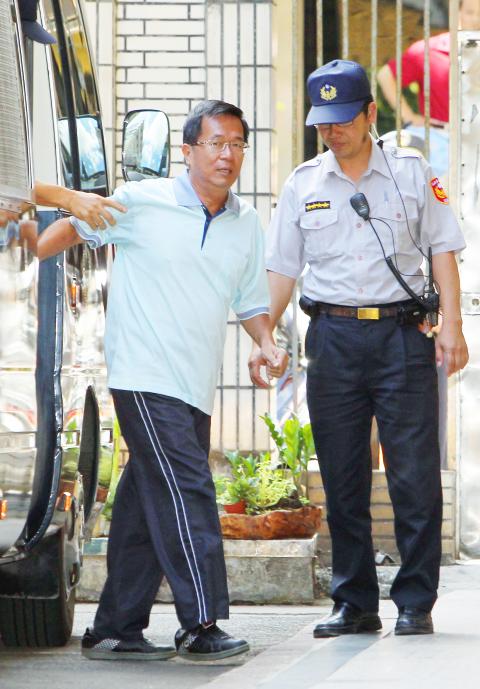Former president Chen Shui-bian (陳水扁) made his first court appearance yesterday since reports emerged on Tuesday that he has attempted suicide three times since first being taken into custody in late 2008.
Chen, who is serving a 17-and-a-half-year sentence on corruption charges, arrived at the Taiwan High Court to the cheers of around 20 of his supporters. He looked tired and ill.
Chen was there to appeal a district court decision that found him guilty of pressuring his close aide Lin Teh-hsun (林德訓) to give false testimony to investigators looking into irregularities in his administration of special state affairs funds during his tenure as president between 2000 and 2008.

Photo: Lo Pei-der, Taipei Times
During the hearing, the former president reiterated his innocence and made his statements standing up, even though the judges gave him the option to sit down.
“I did not direct anyone to provide false testimony,” Chen said.
Saying that he had been wrongfully accused by prosecutors whose sole purpose was to humiliate him, Chen expressed the hope that the court would re-examine the case in detail and prove his innocence.
“It has not been easy for me to stay alive until today,” Chen said at the end of the hearing, adding that anyone who had been subjected to the humiliation he experienced would have thought about death.
The court is scheduled to make a ruling on the case on Aug. 17.
Before the hearing, Chen’s lawyer, Shih Yi-lin (石宜琳), told the press that Chen has been talking off-topic and showing signs of anxiety lately. Shih asked the judges to finish the hearing by noon because a psychiatrist was scheduled to visit Chen later that day.
According to the Ministry of Justice, a doctor from the psychiatry department at Chang Gung Hospital in New Taipei City’s (新北市) Linkou District (林口) visited the Taipei Prison yesterday afternoon to check Chen’s health.

Taiwanese can file complaints with the Tourism Administration to report travel agencies if their activities caused termination of a person’s citizenship, Mainland Affairs Council Minister Chiu Chui-cheng (邱垂正) said yesterday, after a podcaster highlighted a case in which a person’s citizenship was canceled for receiving a single-use Chinese passport to enter Russia. The council is aware of incidents in which people who signed up through Chinese travel agencies for tours of Russia were told they could obtain Russian visas and fast-track border clearance, Chiu told reporters on the sidelines of an event in Taipei. However, the travel agencies actually applied

New measures aimed at making Taiwan more attractive to foreign professionals came into effect this month, the National Development Council said yesterday. Among the changes, international students at Taiwanese universities would be able to work in Taiwan without a work permit in the two years after they graduate, explainer materials provided by the council said. In addition, foreign nationals who graduated from one of the world’s top 200 universities within the past five years can also apply for a two-year open work permit. Previously, those graduates would have needed to apply for a work permit using point-based criteria or have a Taiwanese company

The Shilin District Prosecutors’ Office yesterday indicted two Taiwanese and issued a wanted notice for Pete Liu (劉作虎), founder of Shenzhen-based smartphone manufacturer OnePlus Technology Co (萬普拉斯科技), for allegedly contravening the Act Governing Relations Between the People of the Taiwan Area and the Mainland Area (臺灣地區與大陸地區人民關係條例) by poaching 70 engineers in Taiwan. Liu allegedly traveled to Taiwan at the end of 2014 and met with a Taiwanese man surnamed Lin (林) to discuss establishing a mobile software research and development (R&D) team in Taiwan, prosecutors said. Without approval from the government, Lin, following Liu’s instructions, recruited more than 70 software

BACK TO WINTER: A strong continental cold air mass would move south on Tuesday next week, bringing colder temperatures to northern and central Taiwan A tropical depression east of the Philippines could soon be upgraded to be the first tropical storm of this year, the Central Weather Administration (CWA) said yesterday, adding that the next cold air mass is forecast to arrive on Monday next week. CWA forecaster Cheng Jie-ren (鄭傑仁) said the first tropical depression of this year is over waters east of the Philippines, about 1,867km southeast of Oluanpi (鵝鑾鼻), and could strengthen into Tropical Storm Nokaen by early today. The system is moving slowly from northwest to north, and is expected to remain east of the Philippines with little chance of affecting Taiwan,